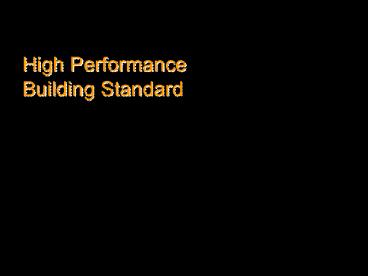High Performance Building Standard - PowerPoint PPT Presentation
1 / 13
Title:
High Performance Building Standard
Description:
Evaluate building technology to meet the above criteria. ... Identify specific performance goals that would be used to define a high performance building. ... – PowerPoint PPT presentation
Number of Views:30
Avg rating:3.0/5.0
Title: High Performance Building Standard
1
High PerformanceBuilding Standard
2
- Public Law 93-383, Sect. 809 (1974)
Congress directed NIBS to exercise its functions
and responsibilities in four general areas,
relating to building regulations..
- Develop maintain performance criteria for
maintenance of life, safety, health, and public
welfare for the built environment. - Evaluate building technology to meet the above
criteria. - Conduct related and needed investigations
- Assemble, store, and disseminate technical data
and related information
NIBS acts as a non-threatening open forum host
for capital facilities industry collaboration and
a recognized consensus process
3
Energy Policy Act of 2005
- Sec. 914. BUILDING STANDARDS.
- (a) DEFINITION OF HIGH PERFORMANCE BUILDINGS.
In this section, the term high performance
building means a building that integrates and
optimizes all major high-performance building
attributes, including energy efficiency,
durability, life-cycle performance, and occupant
productivity.
4
Energy Policy Act of 2005
- (b) ASSESSMENT. Not later than 120 days after
the date of enactment of this Act, the Secretary
shall enter into an agreement with the National
Institute of Building Sciences to - (1) conduct an assessment (in cooperation with
industry standards development organizations) of
whether the current voluntary consensus standards
and rating systems for high performance buildings
are consistent with the current technological
state of the art, including relevant results from
the research, development and demonstration
activities of the Department
5
Energy Policy Act of 2005
- (2) determine if additional research is
required, based on the findings of the
assessment and - (3) recommend steps for the Secretary to
accelerate the development of voluntary
consensus-based standards for high performance
buildings that are based on t he findings of the
assessment.
6
Energy Policy Act of 2005
- (c) GRANT AND TECHNICAL ASSISTANCE PROGRAM.
Consistent with subsection (b) and section 12 (d)
of the National Technology Transfer and
Advacement Act of 1995, the Secretary shall
establish a grant and technical assistance
program to support the development of voluntary
consensus-based standards for high performance
buildings.
7
Assessment Methodology
- Identify specific performance goals that would be
used to define a high performance building. - Identify specific performance metrics and
benchmarks for providing for performance goals. a
matrix. - Catalogue existing industry standards and
programs that are used to measure or validate the
specific performance metrics including the
identification of gaps and standards needed to
measure and validate high performance buildings. - Develop final framework and document assessment.
8
Defining High Performance Buildingsthrough
Performance Goals
- Building Life Span
- Systems Life Spans
- Building Operation
- Building Maintenance
- Occupant Productivity
- Occupant Safety and Security
- Mission Performance
- Building Efficiency
- Systems Performance
9
Identifying Performance Metrics
- Energy Use
- Water Use
- Environmental Responsiveness
- Productivity
- Building Flexibility/Efficiency
- Security
- Safety
- Accessibility
- Thermal Comfort
- Acoustical Comfort
- Lighting Comfort
- Indoor Air Quality
- Airtightness
- Moisture Protection
- System/Equipment Efficiency
- System/Equipment Longevity
- System/Equipment Maintenance
- Disaster Operations
10
Cataloguing Performance Validation Methods
- Industry Specifications
- Industry Standards/Test Methods
- Product/System Testing Programs
- Building/Product Certification and Rating
Programs - Federal Requirements
11
What Is It?
- It is Not a
- Building code
- Certification program
- Evaluation program
- Federal requirement
- It is a
- Industry consensus on the definition of high
performance for buildings - Harmonization of existing standards to meet that
definition
12
(No Transcript)
13
Assessment Approach
- Task 1 Conduct Meeting 1
- Agree on scope and building types, agree on
performance goals and areas, form subcommittees,
and formulate subcommittee work plans. - Task 2 Subcommittee Activities
- Define performance metrics and levels, identify
existing and needed validation methods. - Task 3 Conduct Meeting 2
- Develop preliminary consensus on performance
metrics, levels and validation methods. - Task 4 Subcommittee Activities
- Finalize performance metrics, levels and
validation methods. - Task 5 Conduct Meeting 3
- Develop final consensus on performance goals,
metrics, levels and validation methods. - Task 6 Prepare final Assessment Report































